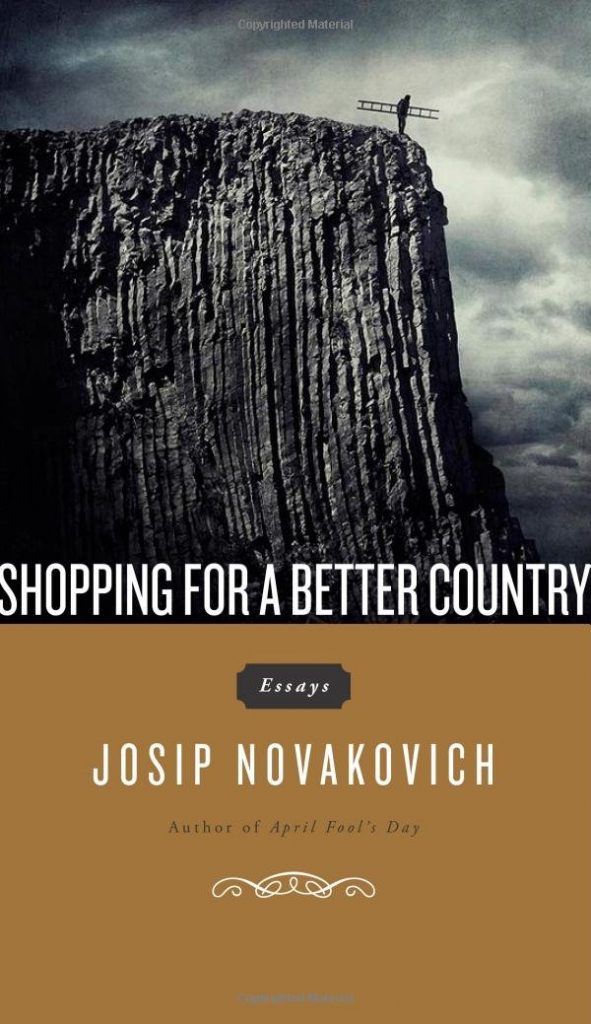
When I first learned that Josip Novakovich was a Croat American writer living in Montreal, I assumed he was an exile who had fled the violence of the war for Croatian independence, or had escaped before that when the former Yugoslav Republic was just another Soviet satellite. He had escaped to the West where he lived free in America as a writer. As for Montreal, I had no idea what to make of Montreal. Then again, I’ve never known what to make of Montreal. In the first piece from his collection of narrative essays, Shopping for A Better Country, Novakovich gently slides my stereotypical assumptions into the garbage bin. He makes a sly start by playing up the stereotype with the account of a countryman deemed insane for his attempt to escape to the West, then he slips into a more mundane story of his own “escape” by student visa in 1976. I imagine myself with his fellow students, waiting for the story of his flight in a hail bullets. Instead, we read about porous borders and a flexible attitude towards place. In fact, Novakovich’s grandparents had settled in Cleveland and returned to what was then Yugoslavia after the First World War. Novakovich left on a student visa and was largely free to come and go as he pleased.
Yet there are hints of violence lurking within the collection. There is the 1991 massacre at Vukovar which is only a two hour drive from Daruvar where Novakovich grew up. His sister is hit by shrapnel in the same year. But Novakovich is determined to leave political divisions and resentments out of his reflections. Nowhere is this clearer than in “Two Croatias” when he confronts both extremes of Croatian lore—its flirtations with fascism and its gorgeous tourist destinations. With characteristic succinctness, he concludes: “It is a complex country deserving of no reductionism.” His answer, it seems, is silence. Or perhaps more accurately: his answer is hidden in the details of ordinary people getting on with their lives.
Novakovich’s writing exemplifies the distinction between nationalism and patriotism. The world can get on very well without nationalism. As for patriotism, I suspect that, like trust, it must be earned. The U.S. has no more entitlement to a citizen’s patriotism than any other country. And that country’s transformation following 9/11 pretty much strips Western critics of any right to judge conditions in Croatia. So the determining question for a patriot seems to be: does a country’s conditions allow ordinary people to get on with their lives.
For Novakovich, that means returning to Croatia to visit his ailing mother and, in the end, to bury her. It means finding cello teachers for his son. It means getting a decent night’s sleep when you have sleep apnea. It means finding a job, which for Novakovich, means going abroad to teach writing courses. And in a piece reminiscent of Geoff Dyer, it means visiting a jazz club in New York City. Patriotism is emphatically not about finding a place to realize grandiose ambitions or to become a very important person.
While we’re mentioning Geoff Dyer … Novakovich compares favourably with one of his peers, Pico Iyer. I say this for two reasons. First is his meditation upon his father (or absence of a father, since his father died when he was a boy). He observes that when he gets together with others whose fathers died when they were young, it feels like children playing without supervision. While Iyer’s father did not die when he was young, Iyer most definitely played without supervision. His latest book, The Man Within My Head, is devoted entirely to his quest for a father surrogate, which he finds in Graham Greene. For Novakovich, his father’s absence is like the superego gone AWOL. He needs a substitute and muses that perhaps that is God’s job. He doesn’t resolve the question of a substitute, although he does conclude that writing is his patrimony, which isn’t quite the same thing as a substitute. Maybe the substitute is country, patria.
The second reason for the comparison to Iyer has to do with The Global Soul. Like Iyer, Novakovich feels at ease in different environments. Borders are porous. He travels a lot. When I first thought of the comparison, I looked for evidence to confirm my intuition, but it wasn’t apparent. Iyer writes about McAirports and McHotels, generic convention centres, a nowhereness that pervades contemporary global culture. Novakovich seems to write against that grain. His world is grittier, more concerned with local details and personal encounters. And yet, as I proceed through the essays, I note a recurring transaction that draws attention away from whatever concern is at hand. It starts innocuously enough with a visit to Croatia and the worry that guards at a checkpoint might be Serbs. It continues in another piece with an absurd conversation amongst self-important guards who are stuck in the habits of the old Soviet regime. It culminates in an airport encounter at Moscow when his son’s cello (purchased in America) is confiscated because it might be a Russian artifact. Finally, Novakovich makes it explicit. In an essay called “Vukovar” (which is not really about the massacre but about passing checkpoints, bureaucracy, and police), he writes:
I don’t prosper around police. In a way I believe that Police is one nation, bigger than Poland. How many cops are there in the world? Well, their jobs are similar, and they are interchangeable.
Iyer’s The Global Soul was published a year before 9/11. Standing on the other side of that great divide, Novakovich has added to Iyer’s list. Like airports and hotels, policing has become a generic commodity in our global culture.
One would think that frequent encounters with police at checkpoints and border patrols might wear a man down. But Novakovich carries it off with gentle humour and a keen eye for the absurd. And now he has settled in Montreal. His sense of the absurd will not atrophy there.